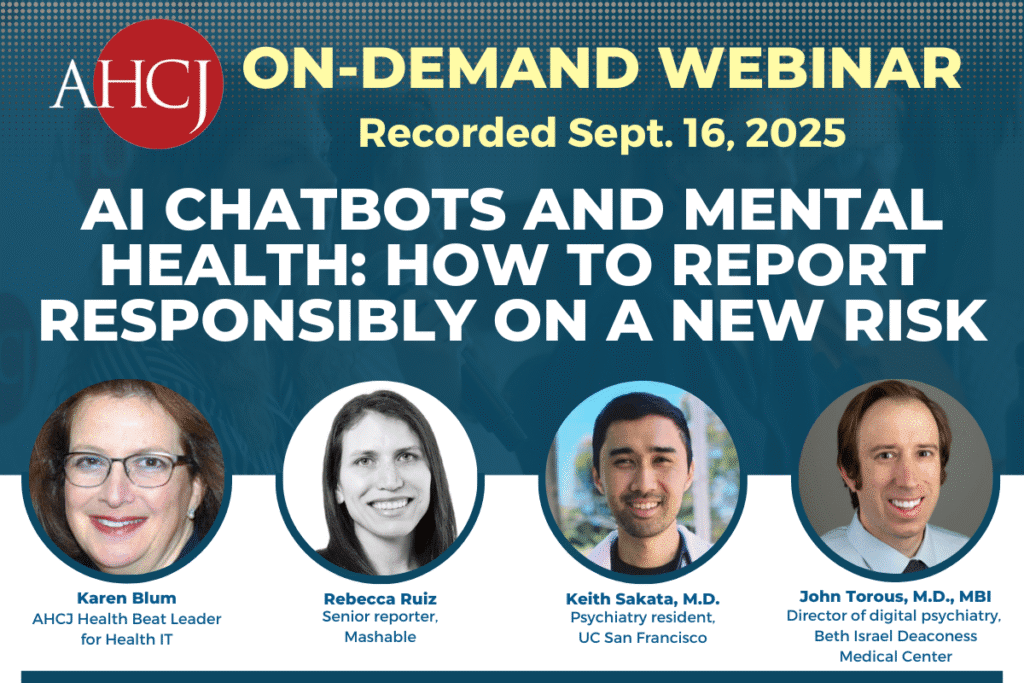Artificial intelligence-powered chatbots can provide round-the-clock access to supportive “conversations,” which some people are using as a substitute for interactions with licensed mental health clinicians or friends. But users may develop dependencies on the tools and mistake these transactions for real relationships with people or true therapy. Recent news stories have discussed the dangers of chatbots’ fabricated, supportive nature. In some incidents, people developed AI-related psychosis or were supported in their plans to commit suicide.
What is it about this technology that sucks people in? Who is at risk? How can you report on these conditions sensitively? In this webinar, hear from moderator Karen Blum and an expert panel, including psychiatrists John Torous, M.D. (Beth Israel Deaconess Medical Center); Keith Sakata, M.D. (UC San Francisco), and Mashable Senior Reporter Rebecca Ruiz, to learn more.

Karen Blum
AHCJ Health Beat Leader for Health IT
Karen Blum is AHCJ’s health beat leader for health IT. She’s an independent health and science journalist, based in the Baltimore area. She has written for publications such as the Baltimore Sun, Pharmacy Practice News, Clinical Oncology News, Clinical Laboratory News, Cancer Today, CURE, AARP.org, General Surgery News and Infectious Disease Special Edition; covered numerous medical conferences for trade magazines and news services; and written many profiles and articles on medical and science research as well as trends in health care and health IT. She is a member of the American Society of Journalists and Authors (ASJA) and chairs its Virtual Education Committee; and a member of the National Association of Science Writers (NASW) and its freelance committee.

Rebecca Ruiz
Senior reporter, Mashable
Rebecca Ruiz is a Senior Reporter at Mashable. She frequently covers mental health, digital culture, and technology. Her areas of expertise include suicide prevention, screen use and mental health, parenting, youth well-being, and meditation and mindfulness. Rebecca’s experience prior to Mashable includes working as a staff writer, reporter, and editor at NBC News Digital and as a staff writer at Forbes. Rebecca has a B.A. from Sarah Lawrence College and a master’s degree from UC Berkeley’s Graduate School of Journalism.

Keith Sakata, M.D.
Psychiatry resident, UC San Francisco
Keith Sakata, M.D., is a psychiatry resident at the University of California, San Francisco, where he founded the Mental Health Innovation and Digital Hub (MINDHub) to advance AI-enabled care delivery. He provides treatment and psychotherapy across outpatient and specialty clinics, with a focus on dual diagnosis, PTSD, OCD, pain, and addiction.
Dr. Sakata previously trained in internal medicine at Stanford Health Care and co-founded Skript, a diagnostic training platform adopted by UCSF and Stanford that improved medical education outcomes during the COVID-19 pandemic. He currently serves as Clinical Lead at Sunflower, an addiction recovery startup. He also helps and advises startups working to improve access in mental health: including Two Chairs, and Circuit Breaker Labs, which is providing a safety layer for AI tools in mental health care.
His professional interests bridge psychiatry, neuroscience, and digital innovation. Dr. Sakata holds a B.S. in Neurobiology from UC Irvine and earned his M.D. from UCSF.

John Torous, M.D., MBI
Director, Digital Psychiatry, Beth Israel Deaconess Medical Center
John Torous, M.D., MBI, is director of the digital psychiatry division in the Department of Psychiatry at Beth Israel Deaconess Medical Center (BIDMC), a Harvard Medical School-affiliated teaching hospital, where he also serves as a staff psychiatrist and associate professor. He has a background in electrical engineering and computer sciences and received an undergraduate degree in the field from UC Berkeley before attending medical school at UC San Diego. He completed his psychiatry residency, fellowship in clinical informatics and master’s degree in biomedical informatics at Harvard.
Torous is active in investigating the potential of mobile mental health technologies for psychiatry and his team supports mindapps.org as the largest database of mental health apps, the mindLAMP technology platform for scalable digital phenotyping and intervention, and the Digital Navigator program to promote digital equity and access. Torous has published over 300 peer-reviewed articles and five book chapters on the topic. He directs the Digital Psychiatry Clinic at BIDMC, which seeks to improve access to and quality of mental health care through augmenting treatment with digital innovations.
Torous serves as editor-in-chief for the journal JMIR Mental Health, web editor for JAMA Psychiatry, and a member of various American Psychiatric Association committees.

